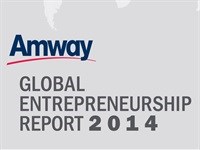
Top stories





ESG & SustainabilitySouth Africa’s carbon tax should stay: climate scientists explain why
Britta Rennkamp et al. 1 hour

More news




















"AGER is a significant tool to deepen our understanding of what motivates entrepreneurs and gain greater insight. We believe it's our role as the private sector to provide key opinion leaders and decision makers in politics, economy and society with a basis for measures to encourage the foundation of businesses," says Raj Parshotam, GM for Amway in Southern Africa.
Unique in its broadness and regularity, the report fosters global discussion on entrepreneurship and raises awareness of the significant role entrepreneurs play in modern economies. This year's report spans 38 markets, with face-to-face and telephone interviews conducted with 43,902 men and women aged 14-99.
While today's youth face the threat of an uncertain working future, the findings of the latest report showed that entrepreneurship enjoys a high reputation amongst the younger generation globally, as a greater number of young people imagine starting their own business.
"The most surprising yet encouraging results of our recent study are that 77% of South African respondents have a positive attitude towards entrepreneurship while 71% of them believe that entrepreneurship can be taught.
"This entrepreneurial potential presents an opportunity for the development of South Africa's economy. Government, businesses and educational institutions should continue to join efforts to reduce structural obstacles and create a sound basis for everyone willing to start their own enterprise."
Boris Urban, a Professor at the Graduate School of Business Administration, Wits Business School (WBS), was commissioned as the local academic partner to contribute to the interpretation of the local AGER results.

According to Professor Urban, an interesting finding is that South African respondents think that entrepreneurship education should be taught at schools and secondary education establishments as well as at start-up programs provided by companies and NGOs. Very few (15%) respondents think that individuals should learn on their own when it comes to entrepreneurship education.
"Overall in South Africa, entrepreneurial potential is high and there are positive attitudes towards entrepreneurial activity. More university graduates (65%) are starting their own businesses where leadership and management skills are perceived to be crucial for entrepreneurship education. Additionally, university graduates are more positive than respondents without a degree in terms of self-employment as well the entrepreneurship-friendliness of society," he says.
Parshotam adds that policymakers should therefore work with education establishments to facilitate entrepreneurship education throughout the curriculum at all ages and levels of attainment. He says that established and successful entrepreneurs may also function as role models for potential and new entrepreneurs. Through mentoring programmes and business networks, potential and actual entrepreneurs may obtain crucial first-hand information, especially during the start-up phase.
"This year's report points to the younger generation's optimism and their great potential. We must use this key insight to continue fostering the entrepreneurial spirit and create a culture that unleashes the capabilities of our younger people," concludes Parshotam.